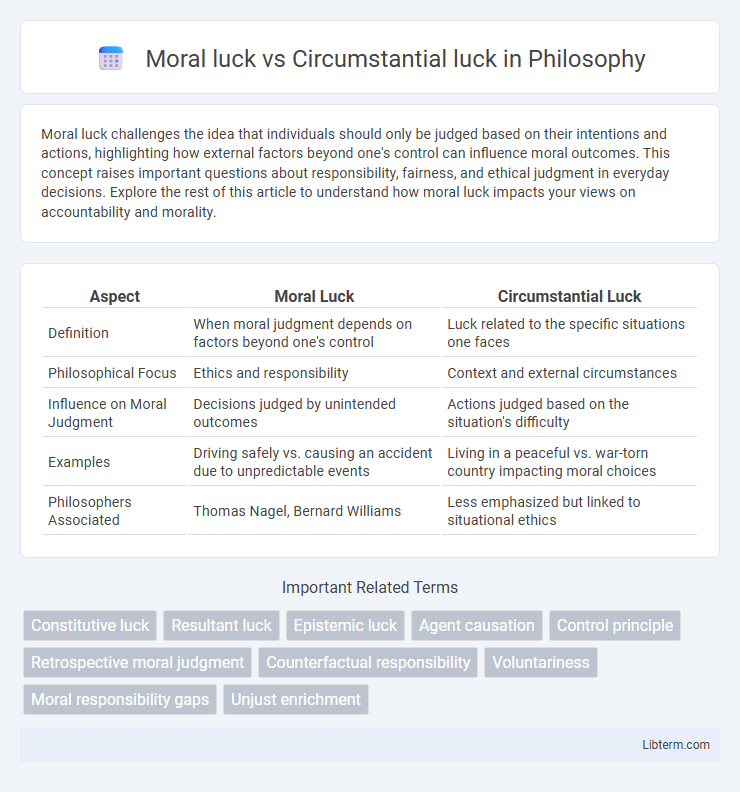Moral luck challenges the idea that individuals should only be judged based on their intentions and actions, highlighting how external factors beyond one's control can influence moral outcomes. This concept raises important questions about responsibility, fairness, and ethical judgment in everyday decisions. Explore the rest of this article to understand how moral luck impacts your views on accountability and morality.
Table of Comparison
| Aspect | Moral Luck | Circumstantial Luck |
|---|---|---|
| Definition | When moral judgment depends on factors beyond one's control | Luck related to the specific situations one faces |
| Philosophical Focus | Ethics and responsibility | Context and external circumstances |
| Influence on Moral Judgment | Decisions judged by unintended outcomes | Actions judged based on the situation's difficulty |
| Examples | Driving safely vs. causing an accident due to unpredictable events | Living in a peaceful vs. war-torn country impacting moral choices |
| Philosophers Associated | Thomas Nagel, Bernard Williams | Less emphasized but linked to situational ethics |
Understanding Moral Luck: Definition and Scope
Moral luck refers to situations where individuals are judged based on outcomes influenced by factors beyond their control, while circumstantial luck involves the surrounding conditions that impact decision-making and behavior. Understanding moral luck requires analyzing how external circumstances affect moral responsibility and accountability, often challenging traditional notions of ethics and justice. The scope of moral luck extends to legal and philosophical debates about fairness, intention, and the consequences of one's actions under varying conditions.
What is Circumstantial Luck? A Clear Overview
Circumstantial luck refers to the external situations and conditions beyond an individual's control that significantly impact moral judgment and outcomes. It involves factors such as unforeseen accidents, social environments, or historical context that shape the consequences of one's actions regardless of intent. Understanding circumstantial luck is crucial for evaluating moral responsibility in varied life scenarios influenced by chance events.
Origins and Philosophical Foundations of Moral Luck
Moral luck originates from the philosophical exploration of how factors beyond an agent's control influence moral judgment, a concept first extensively analyzed by philosophers Thomas Nagel and Bernard Williams in the late 20th century. This idea challenges traditional views of moral responsibility by highlighting the discrepancy between control and moral assessment. Circumstantial luck, a subset of moral luck, refers to the impact of situational contexts on moral actions, illustrating how external conditions shape ethical evaluations and philosophical debates about free will and accountability.
Types of Moral Luck: Resultant, Constitutive, Circumstantial, Causal
Moral luck encompasses various types including resultant, constitutive, circumstantial, and causal luck, each influencing moral judgment differently. Resultant moral luck refers to the outcomes of actions affecting moral assessment, while constitutive moral luck involves elements of one's character shaped by factors beyond control. Circumstantial moral luck pertains to the specific situations one faces, and causal moral luck concerns the chain of events leading to one's actions, all impacting how moral responsibility is attributed.
Key Features of Circumstantial Luck Explored
Circumstantial luck involves factors beyond an individual's control that situate them in particular situations affecting their moral evaluation, such as being present during a crisis or accident. Key features include unpredictability, the external environment's influence on moral outcomes, and the significant role of situational context in determining responsibility or blame. This form of luck contrasts with moral luck related to character traits, emphasizing how external circumstances shape ethical judgments.
Moral Responsibility: How Luck Influences Right and Wrong
Moral luck challenges traditional notions of moral responsibility by highlighting how factors beyond an individual's control influence judgments of right and wrong. Circumstantial luck, a subset of moral luck, refers to how external situations determine one's moral decisions and outcomes, affecting accountability despite identical intentions. This interplay complicates ethical evaluations, as individuals may be praised or blamed based on luck-driven circumstances rather than purely their choices.
Famous Philosophers on Moral and Circumstantial Luck
Famous philosophers such as Thomas Nagel and Bernard Williams extensively analyzed moral luck, highlighting how external factors beyond an individual's control influence moral judgment. Aristotle's virtue ethics contrasts with this by emphasizing character regardless of circumstances, while contemporary thinkers like Susan Wolf explore the interplay between moral responsibility and circumstantial luck. The debate critically examines how chance events impact ethical accountability and moral evaluation in human actions.
Real-World Examples: Moral Luck vs Circumstantial Luck
Moral luck arises when individuals are judged based on outcomes beyond their control, as seen in cases where two drivers exhibit identical reckless behavior but only one causes an accident. Circumstantial luck pertains to situational factors that influence a person's actions, exemplified by political dissidents whose fates hinge on the political climate they inhabit. These distinctions highlight how moral responsibility can vary significantly depending on whether luck affects personal decisions or external circumstances.
Debates and Criticisms: The Luck Problem in Ethics
Debates on moral luck versus circumstantial luck highlight the challenge of attributing moral responsibility when outcomes depend on factors beyond an agent's control, raising the luck problem in ethics. Critics argue that moral luck undermines the fairness of moral judgments, as individuals may be praised or blamed for actions influenced by chance circumstances rather than their intentions or efforts. The ethical dilemma centers on reconciling the intuitive sense of moral accountability with the unpredictable impact of luck on human behavior and consequences.
Implications for Justice and Personal Accountability
Moral luck challenges traditional notions of personal accountability by highlighting how factors beyond an individual's control influence moral judgments, complicating the assignment of justice. Circumstantial luck refers to the particular situations people find themselves in, which can affect their opportunities for ethical or unethical behavior, thereby impacting fairness in legal and moral assessments. Recognizing these forms of luck necessitates a nuanced approach to justice that balances responsibility with the acknowledgment of external influences on moral outcomes.
Moral luck Infographic

 libterm.com
libterm.com